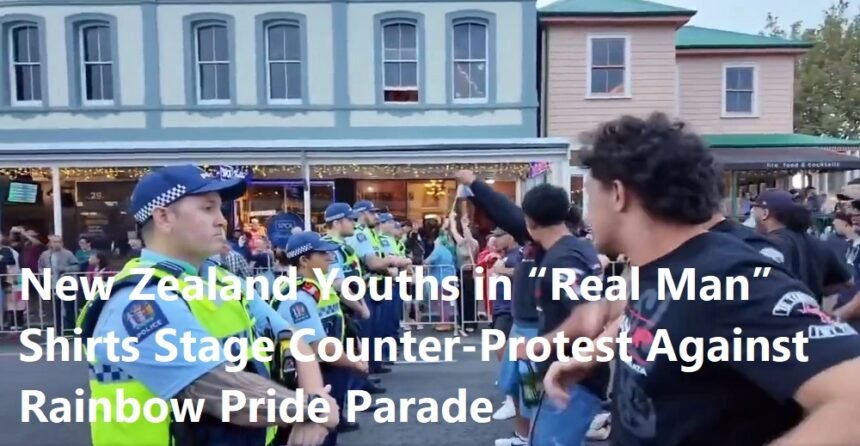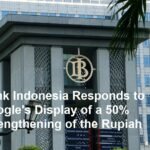A group of young men in New Zealand sparked controversy this week by organizing a counter-protest during a local LGBTQ+ Pride parade, wearing shirts emblazoned with “REAL MAN” slogans. The demonstration, held in Auckland, has ignited fierce debates about masculinity, inclusivity, and freedom of expression in a nation widely regarded as progressive on LGBTQ+ rights.
The counter-protesters, numbering around 50, gathered near the Auckland Pride Parade route on Saturday, holding signs with messages such as “Protect Traditional Values” and “Biology Matters.” Their black shirts featured the phrase “REAL MAN” in bold white letters, which organizers claimed was meant to promote “traditional masculinity” and critique the growing visibility of gender-diverse identities.
One participant, who identified only as “Jake,” stated, “We’re not against anyone’s right to exist. But we’re tired of being told that masculinity is toxic. Real men protect their families and communities—that’s what we stand for.” The group framed their action as a defense of “biological reality” and criticized what they called “forced acceptance” of LGBTQ+ ideologies.
The Pride parade, attended by thousands, included floats from corporations, schools, and advocacy groups celebrating diversity. Organizers condemned the counter-protest as divisive. “This is a classic tactic to intimidate queer communities under the guise of ‘free speech,’” said Aria Wilson, a spokesperson for Auckland Pride. “Their message undermines the progress we’ve made toward acceptance.”
Many parade attendees expressed frustration. “It’s heartbreaking to see such ignorance in 2024,” said Marco Silva, a university student attending his first Pride event. “Their idea of a ‘real man’ excludes so many people who are just trying to live authentically.”
New Zealand has long been a leader in LGBTQ+ rights, legalizing same-sex marriage in 2013 and banning conversion therapy in 2022. However, the counter-protest highlights simmering tensions among conservative factions. Analysts link the demonstration to global trends, including the rise of online “manosphere” influencers promoting rigid gender roles.
Prime Minister Christopher Luxon addressed the incident cautiously, stating, “New Zealanders have the right to peaceful protest, but we must ensure all voices are heard without fostering hatred.” Opposition leaders, meanwhile, accused the government of inadequately addressing hate speech.
The phrase “real man” has become a flashpoint in cultural wars worldwide. Psychologists warn that such rhetoric can harm men’s mental health by enforcing unrealistic expectations. “Masculinity isn’t a monolith,” argued Dr. Liam O’Connor, a gender studies lecturer at the University of Otago. “Tying manhood to aggression or dominance ignores the diversity of male experiences.”
Conversely, supporters of the counter-protest argue that modern discourse unfairly vilifies traditional male traits. “There’s nothing wrong with celebrating strength and responsibility,” said blogger Tom Harris, whose viral posts criticize “woke masculinity.”
New Zealand’s Human Rights Act prohibits discrimination based on gender identity, but the counter-protesters’ actions walked a legal tightrope. Police monitored the event but made no arrests, citing the protesters’ compliance with public order laws. Legal experts note that while offensive speech isn’t inherently illegal, threats or incitement to violence would cross the line.
The counter-protest’s young demographic—mostly men in their late teens to mid-20s—reflects a generational divide. While global surveys show Gen Z as the most LGBTQ+-affirming generation, a vocal minority is pushing back, often fueled by social media algorithms promoting polarizing content.
“These young men feel alienated by rapid social changes,” said sociologist Dr. Emily Green. “They’re seeking belonging, but platforms like YouTube and TikTok are funneling them into echo chambers that radicalize their views.”
In the protest’s aftermath, local LGBTQ+ groups organized workshops on allyship and mental health. A viral social media campaign, #RealMenSupportEquality, also emerged, with men sharing stories of embracing vulnerability and supporting queer loved ones.
“We won’t let a small group define what masculinity means,” said campaign participant Daniel Lee, a rugby coach. “Real strength is in kindness, not exclusion.”
The Auckland incident underscores the challenges of balancing free expression with social harmony. As New Zealand grapples with evolving gender norms, the clash between tradition and progressivism shows no signs of abating. For the LGBTQ+ community, the protest is a reminder of the work still needed to achieve true acceptance. For the counter-protesters, it raises questions about the cost of clinging to rigid ideals in a changing world.
In a society celebrated for its inclusivity, the path forward may lie in dialogue—not division. As Rainbow Youth NZ director Tania Linhart urged, “Let’s listen to each other’s fears and hopes. Only then can we build a future where everyone belongs.”













